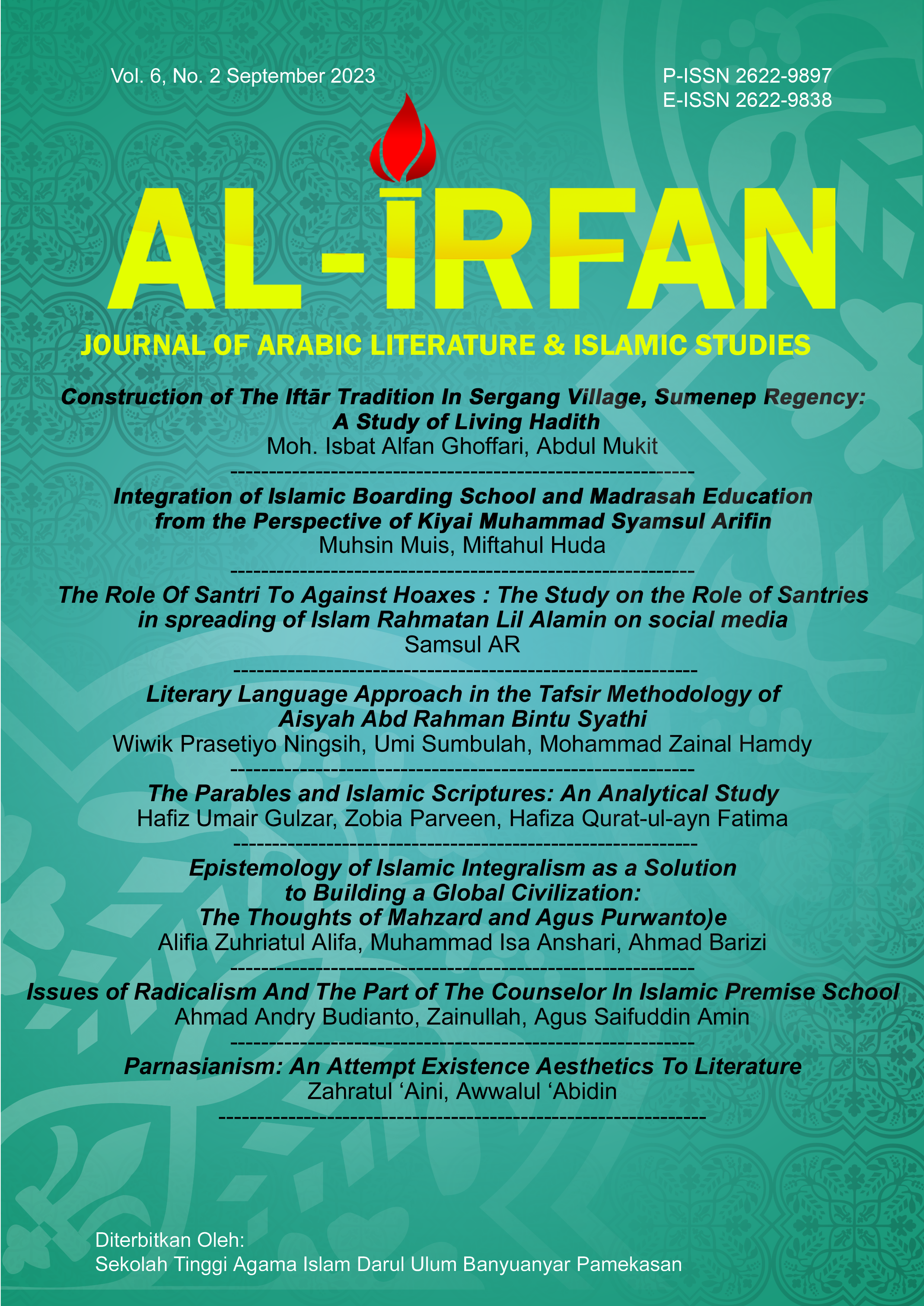Construction of The IftÄr Tradition In Sergang Village, Sumenep Regency
A Study of Living Hadith
DOI:
https://doi.org/10.58223/alirfan.v6i2.6862Keywords:
Keywords: Tradition, IfthÄr , Contruction, Tradisi, IfthÄr , KonstruksiAbstract
The author's research aims to explain the construction of the IfthÄr tradition in Sergang Village and the reception of hadiths that underlie the emergence of the IfthÄr tradition, as well as other hadiths related to the IfthÄr tradition. The research method to be employed is field research, conducted by directly interviewing practitioners (insiders), the general public (outsiders), and community leaders in order to achieve comprehensive research. The research will utilize the theory proposed by Peter L. Berger, using the triad dialectic theory, namely: externalization, objectification, and internalization. The results of the research show that the transmission of the IfthÄr tradition has been ongoing for over a century, starting from the third caretaker of Raudlatus Syabab Islamic Boarding School, K.H. Syarqowi. There are two main hadiths that serve as the foundation for this tradition, namely the hadith about IfthÄr and the hadith about the virtue of giving charity. Initially, there were no pre-IfthÄr rituals among the villagers in Sergang Village. However, over time, the alumni of Pesantren Pajung, who are scattered in various regions, began organizing IfthÄr in their own areas, adding several pre-IfthÄr rituals. As for the transformation of the hadiths in the IfthÄr tradition in Sergang Village, it has undergone five periods, influenced by influential figures from the past until the present era.References
Berger, P. L., Parera, F. M., & Luckman, T. (1990). Tafsir sosial atas kenyataan: Risalah tentang sosiologi pengetahuan. LP3ES.
De Jonge, H. (1989). Agama, kebudayaan, dan ekonomi: Studi-studi interdisipliner tentang masyarakat Madura. Rajawali.
Imam Suprayogo dan Tobroni. (2003). Metodologi Penelitian Soial-Agama. Bandung: Remaja Rosdakarya
Imron Arifin. (1976). Kepemimpinan Kyai: Kasus Pondok Pesantren Tebuireng. Malang: Kalimasahada Press
Janet M. Ruane. (2013). Dasar-dasar metode penelitian: Panduan riset ilmu sosial. Bandung: Penerbit Nusa Media
Kuntowijoyo. (2002). Perubahan sosial dalam masyarakat agraris Madura, 1850-1940. Matabangsa bekerja sama dengan Yayasan Adikarya IKAPI dan the Ford Foundation.
Mu’awwanah, N. (2018). Konstruksi Pemahaman Masyarakat Terhadap Hadis" Kullu Bid’atin Dlalalah". Jurnal Studi Ilmu-Ilmu Al-Qur’an Dan Hadis, 17(2), 159–186.
Pals, D. L. (1996). Seven theories of religion. Oxford University Press New York.
Qudsy, S. Z., Masduki, M., & Abror, I. (2017a). Puasa Senin Kamis di Kampung Pekaten. Proceedings of Annual Conference for Muslim Scholars, Seri 2, Article Seri 2. https://doi.org/10.36835/ancoms.v0iSeri
Qudsy, S. Z., Masduki, M., & Abror, I. (2017b). Puasa Senin Kamis di Kampung Pekaten. Proceedings of Annual Conference for Muslim Scholars, 564–573.
Siti Umi Hanik. (2011). Nilai-nilai pendidikan Islam dalam tradisi Tahlilan di Desa Krembangan Taman Sidoarjo. Surabaya: Tesis IAIN Sunan Ampel
Turner, B. S. (2012). Teori Sosial dari Klasik sampai postmodern. Yogyakarta: Pustaka Pelajar.
Wibowo dkk. (2022). Tata Krama Suku Bangsa Madura. Yogyakarta : Badan Pengembangan Kebudayaan dan Pariwisata
Zamakhsyari Dhofier. (1985). Tradisi Pesantren: Studi Tentang Pandangan Hidup Kyai dan Visinya Mengenai Masa Depan Indonesia. Jakarta: LP3ES,1985
Downloads
Published
How to Cite
Issue
Section
License
Copyright (c) 2023 Moh. Isbat Alfan Ghoffari, Abdul Mukit

This work is licensed under a Creative Commons Attribution 4.0 International License.
Lisensi :
Al-Irfan: Journal of Arabic Literature and Islamic Studies is published under conditions Creative Commons Attribution 4.0 International License / CC BY 4.0 This license permits anyone to copy and redistribute this material in any form or format, modify, modify, and make derivative works of this material for any purpose, including commercial purposes, so long as they credit the author for the original work.











